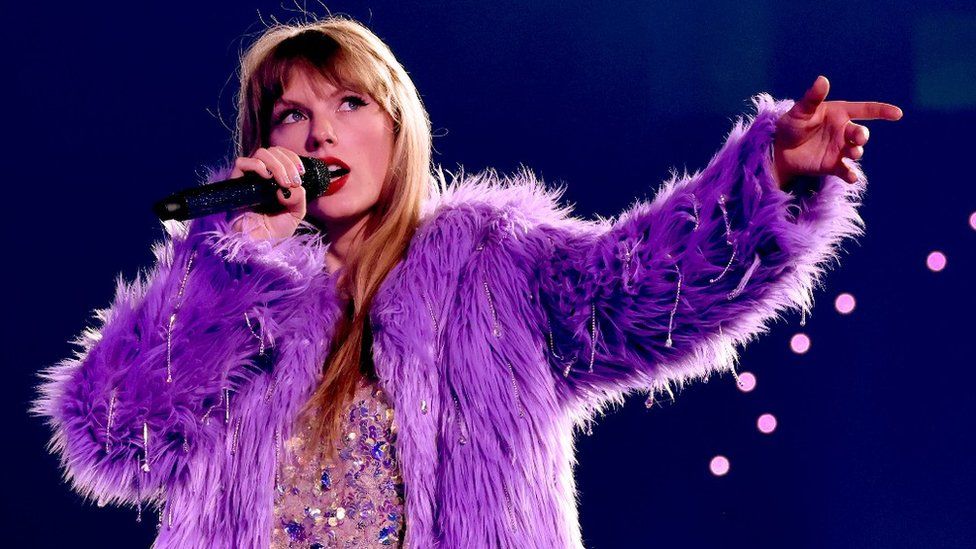ARTICLE AD BOX
 Image source, Getty Images
Image source, Getty Images
Taylor Swift was the biggest-selling artist in the world last year
By Mark Savage
BBC Music Correspondent
The success of artists like Taylor Swift and BTS helped global music revenues rise to $26.6bn (£21.7bn) last year, the highest level since records began in the 1990s.
The growth was largely driven by streaming, which now accounts for 67% of the industry's earnings.
Last year, 589 million people paid for a subscription, said trade body the IFPI, up from 523 million in 2021.
But labels say income could be higher, and are pushing for prices to rise.
"It would help if music subscription pricing could reflect the realities of inflation," said Simon Robson, president of international markets for Warner Music.
The UK's largest streaming service, Spotify, hasn't increased its prices since launching in 2009, with an individual subscription set at £9.99. Most of its competitors maintain a similar pricing structure.
Warner Music CEO Robert Kyncl recently told Music Week: "Music is undervalued, and this is not my opinion - there are actually numbers to back it up.
"If you take the US, the price that the user pays per hour of consumption of music is half of what they pay for movies and TV shows on streaming services. So right there, it's 50% undervalued today."
Asked whether labels were actively pursuing price rises, Universal Music executive Adam Granite said it "wouldn't be appropriate to discuss any of our commercial partnerships specifically".
In the meantime, labels are seeking to "monetise other forms of music consumption" by licensing songs to video games like Fortnite and Roblox, and fitness companies like Peloton.
Live music back to pre-pandemic levels
Image source, Getty Images
Image caption,Bad Bunny had the highest-grossing tour of 2022
Their comments came as the IFPI announced that the global music industry was enjoying its eighth consecutive year of growth.
Sales of physical formats rose by 4%, generating $4.6bn (£3.7bn) in revenues.
Almost half of that figure (49.8%) came from Asia, where the "idol" culture of Japan and South Korea encourages fans to buy CDs and vinyl as keepsakes.
Performance royalties also rose by 8.6% to $2.5bn (£2.04bn), surpassing pre-pandemic levels after two years of turmoil for the live music industry.
The US remained the world's largest music market, with Japan second and the UK in third place.
China rose to become the fifth largest market, replacing France, after revenues there rose by 28.4%.
The turnaround is particularly encouraging, said Mr Granite, because "10 years ago [China] was almost entirely lost to piracy".
Taylor Swift tops the charts
Image source, EPA
Image caption,BTS were the biggest band in the world, and the second most-popular act overall
The IFPI report highlighted the increasingly global nature of music consumption, with seven countries represented in last year's top 10 artists.
Taylor Swift was the biggest seller of 2022, thanks to the success of her 10th album, Midnights, and the ongoing popularity of her back catalogue.
It's the third time Swift has topped the annual worldwide chart since its inception 10 years ago, having previously been number one in 2014 and 2019.
She usurped the 2021 winners, South Korean pop group BTS, who took the runners-up position this time. Two other K-pop bands made the top 10 - with Seventeen and Stray Kids in sixth and seventh places respectively.
Harry Styles had the biggest-selling song of the year, with his Grammy and Brit-Award winning hit As It Was.
UK artists were responsible for another seven of the top 20 songs, with Glass Animals' sleeper hit Heat Waves at number two; Elton John and Dua Lipa's collaboration Cold Heart at four; and further tracks from Ed Sheeran, Adele and Dua Lipa making the chart.
Kate Bush's 1985 hit Running Up That Hill (A Deal With God) ended the year as the 16th most successful song, thanks to its use in sci-fi show Stranger Things.
Puerto Rican star Bad Bunny claimed the number one album around the world with Un Verano Sin Ti, the first Spanish-language album to top that chart.
Swift's Midnights came second, with Styles' Harry's House at three.
Follow us on Facebook or on Twitter @BBCNewsEnts. If you have a story suggestion email entertainment.news@bbc.co.uk.

 2 years ago
107
2 years ago
107









 English (US) ·
English (US) ·